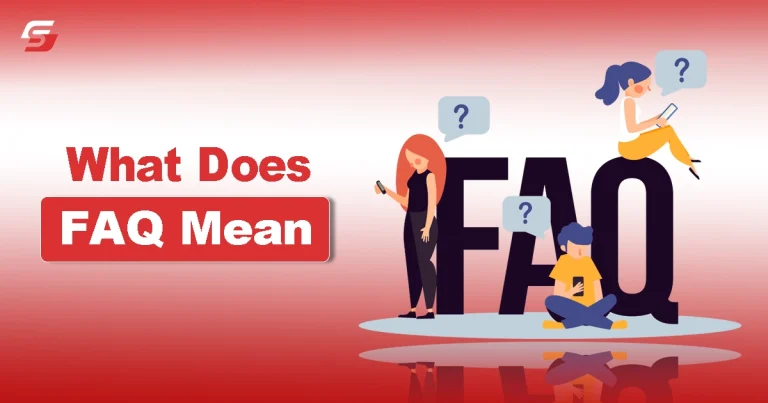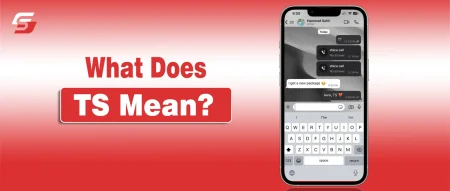Have you ever visited a website and seen a section labeled “FAQ“? If you’ve ever wondered what that means or why it’s there, you’re not alone. The term “FAQ” is short, but it plays a big role in how we find information online.
In this article, learn what is the meaning of FAQ, where it’s used, and why it’s important, along with examples.
What Does FAQ Stand For?
FAQ stands for Frequently Asked Questions. It’s a collection of common questions and their answers on a specific topic, product, or service.
This section helps people quickly find answers to things they often ask, without needing to contact customer service or ask someone else.
Let’s break it down:
- Frequently = Often or regularly
- Asked = Questions people ask
- Questions = Inquiries or things people want to know
So, when you put it all together, an FAQ is a list of questions people regularly ask, and the answers are provided right there for convenience.
You may also like to read the related article: BRB Meaning – Definition, Usage and Example
Where Are FAQs Used?
FAQs are everywhere. You’ll commonly find them on:
- Company websites
- Online stores
- Mobile apps
- Customer support pages
- Blogs
- Product manuals
Here are some everyday examples of where you might see an FAQ section:
1. Online Shopping Websites
Have you ever bought something online and wondered, “How long will delivery take?” or “What is the return policy?” These common questions are usually listed under the site’s FAQ section.
2. Subscription Services
Netflix, Spotify, or Amazon Prime all have FAQ sections that answer questions like:
- “How do I cancel my subscription?”
- “Can I watch on multiple devices?”
3. Educational Platforms
Sites like Coursera or Khan Academy offer FAQs that help new users with questions like:
- “Do I get a certificate after completing a course?”
- “Is there a free trial available?”
4. Social Media Apps
Even apps like Instagram or Facebook have FAQ sections. They answer questions such as:
- “How do I recover a hacked account?”
- “How do I report inappropriate content?”
Why Are FAQs Important?
1. Saves Time for Everyone
One of the biggest benefits of an FAQ section is time-saving. Users can find answers immediately, instead of sending an email or calling customer support. This is especially helpful for simple questions that don’t require personalized responses.
Example:
Imagine a customer wondering about a product’s return policy. Instead of waiting hours (or even days) for an email reply, they can read the FAQ and make a decision right away.
2. Improves User Experience
Good FAQs make a website easier to navigate and more user-friendly. When visitors find quick solutions to their problems, they feel more satisfied and are more likely to trust the brand or service.
Bonus: A helpful FAQ section often reflects positively on the company’s professionalism and commitment to customer care.
3. Reduces Repetitive Support Requests
Customer support teams often receive the same questions over and over. By answering these in a well-organized FAQ section, companies can reduce their support workload. This frees up time to handle more complex or unique issues that need human assistance.
Example:
Questions like “How do I reset my password?” or “Where can I track my order?” can be answered in the FAQ. It allows the support team to focus on solving actual technical problems or customer complaints.
4. Boosts SEO and Website Visibility
From a digital marketing perspective, FAQ pages are great for Search Engine Optimization (SEO). People often type questions into Google like:
- “How to cancel my subscription on [Company]?”
- “Does [Brand] offer international shipping?”
If your FAQ page includes those common queries, Google may display your website in search results driving more traffic to your site.
5. Builds Trust and Transparency
When a company clearly addresses common concerns or policies in its FAQ, it shows openness and honesty. Customers appreciate knowing what to expect, whether it’s about pricing, shipping, warranties, or service limitations.
Example:
A travel company that explains cancellation policies, extra fees, and refund rules upfront earns more trust from customers than one that hides this information.
6. Helps New Users Get Started
For new customers or first-time users, an FAQ section acts like a mini instruction guide. It provides the essential information they need to use a service, buy a product, or create an account all in one place.
This can reduce frustration, increase confidence, and lead to more successful user experiences.
What Makes a Good FAQ?
Not all FAQ sections are helpful. A good FAQ should be:
- Clear and simple: Avoid complicated language.
- Organized by topic: Make it easy to scan.
- Up to date: Remove outdated answers.
- Relevant to the audience: Focus on what people actually want to know.
Tips for Writing FAQs
If you ever need to write an FAQ section, whether for a blog, your small business, or a school project, here are some useful tips:
1. Use Real Questions
Think about what people really ask. You can check customer emails, comments, or even ask friends what they’re curious about.
Example:
Bad FAQ: “Information about pricing.”
Good FAQ: “How much does it cost to use your service?”
2. Keep Answers Short and Direct
Get straight to the point. Don’t make people read a whole paragraph for a simple answer.
Example:
Q: “Can I cancel anytime?”
A: Yes, you can cancel your subscription at any time through your account settings.
3. Group Similar Topics Together
Put related questions under the same heading. For example, group all “Shipping & Returns” questions in one section.
Example of an FAQ Section
Bakery FAQ
Q: What are your store hours?
A: We’re open Monday to Saturday from 9 AM to 6 PM.
Q: Do you offer gluten-free options?
A: Yes, we offer a variety of gluten-free cakes and cookies.
Q: How can I place a custom cake order?
A: You can place a custom order by visiting our “Order” page or calling us directly at (123) 456-7890.
Q: Do you deliver?
A: Yes, we offer delivery within 10 miles of our store location.
This is a clear, helpful FAQ that answers the most common questions customers might have.
Final Thoughts
The next time you come across a FAQ section, you’ll know exactly what it means and why it’s there. Whether you’re shopping online, trying out a new app, or signing up for a course, the FAQ section is your go-to place for quick answers. It saves time, makes life easier, and helps you feel more confident about what you’re doing.










